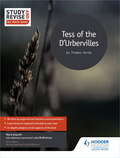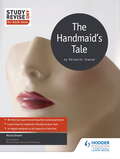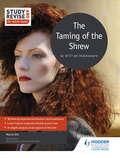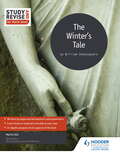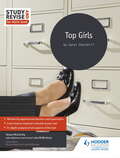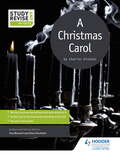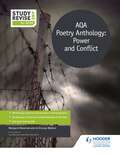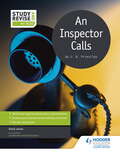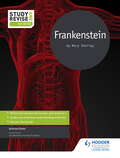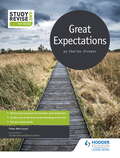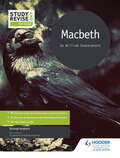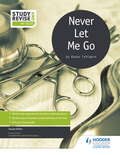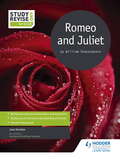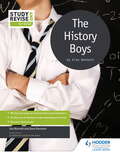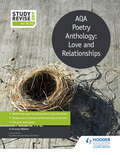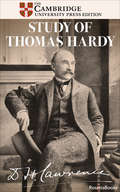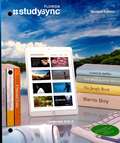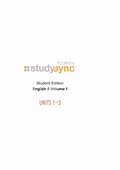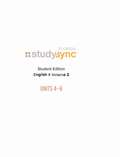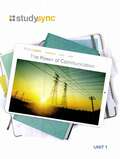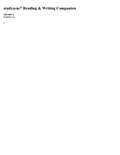- Table View
- List View
Study and Revise for AS/A-level: Tess of the D'Urbervilles
by Mark Asquith Luke McBratneyEnable students to achieve their best grade in AS/A-level English Literature with this year-round course companion; designed to instil in-depth textual understanding as students read, analyse and revise Tess of the D'Urbervilles throughout the course.This Study and Revise guide:- Increases students' knowledge of Tess of the D'Urbervilles as they progress through the detailed commentary and contextual information written by experienced teachers and examiners- Develops understanding of characterisation, themes, form, structure and language, equipping students with a rich bank of textual examples to enhance their coursework and exam responses- Builds critical and analytical skills through challenging, thought-provoking questions and tasks that encourage students to form their own personal responses to the text- Extends learning and prepares students for higher-level study by introducing critical viewpoints, comparative references to other literary works and suggestions for independent research- Helps students maximise their exam potential using clear explanations of the Assessment Objectives, sample student answers and examiner insights- Improves students' extended writing techniques through targeted advice on planning and structuring a successful essay
Study and Revise for AS/A-level: The Handmaid's Tale
by Nicola OnyettEnable students to achieve their best grade in AS/A-level English Literature with this year-round course companion; designed to instil in-depth textual understanding as students read, analyse and revise The Handmaid's Tale throughout the course.This Study and Revise guide:- Increases students' knowledge of The Handmaid's Tale as they progress through the detailed commentary and contextual information written by experienced teachers and examiners- Develops understanding of characterisation, themes, form, structure and language, equipping students with a rich bank of textual examples to enhance their coursework and exam responses- Builds critical and analytical skills through challenging, thought-provoking questions and tasks that encourage students to form their own personal responses to the text- Extends learning and prepares students for higher-level study by introducing critical viewpoints, comparative references to other literary works and suggestions for independent research- Helps students maximise their exam potential using clear explanations of the Assessment Objectives, sample student answers and examiner insights- Improves students' extended writing techniques through targeted advice on planning and structuring a successful essay
Study and Revise for AS/A-level: The Taming of the Shrew
by Nicola Onyett Martin Old Luke McBratneyEnable students to achieve their best grade in AS/A-level English Literature with this year-round course companion; designed to instil in-depth textual understanding as students read, analyse and revise The Taming of the Shrew throughout the course.This Study and Revise guide:- Increases students' knowledge of The Taming of the Shrew as they progress through the detailed commentary and contextual information written by experienced teachers and examiners- Develops understanding of characterisation, themes, form, structure and language, equipping students with a rich bank of textual examples to enhance their coursework and exam responses- Builds critical and analytical skills through challenging, thought-provoking questions and tasks that encourage students to form their own personal responses to the text- Extends learning and prepares students for higher-level study by introducing critical viewpoints, comparative references to other literary works and suggestions for independent research- Helps students maximise their exam potential using clear explanations of the Assessment Objectives, sample student answers and examiner insights- Improves students' extended writing techniques through targeted advice on planning and structuring a successful essay
Study and Revise for AS/A-level: The Winter's Tale By William Shakespeare
by Martin OldEnable students to achieve their best grade in AS/A-level English Literature with this year-round course companion; designed to instil in-depth textual understanding as students read, analyse and revise The Winter's Tale throughout the course.This Study and Revise guide:- Increases students' knowledge of The Winter's Tale as they progress through the detailed commentary and contextual information written by experienced teachers and examiners- Develops understanding of characterisation, themes, form, structure and language, equipping students with a rich bank of textual examples to enhance their coursework and exam responses- Builds critical and analytical skills through challenging, thought-provoking questions and tasks that encourage students to form their own personal responses to the text- Extends learning and prepares students for higher-level study by introducing critical viewpoints, comparative references to other literary works and suggestions for independent research- Helps students maximise their exam potential using clear explanations of the Assessment Objectives, sample student answers and examiner insights- Improves students' extended writing techniques through targeted advice on planning and structuring a successful essay
Study and Revise for AS/A-level: Top Girls
by Shaun McCarthy Luke McBratneyEnable students to achieve their best grade in AS/A-level English Literature with this year-round course companion; designed to instil in-depth textual understanding as students read, analyse and revise Top Girls throughout the course.This Study and Revise guide:- Increases students' knowledge of Top Girls as they progress through the detailed commentary and contextual information written by experienced teachers and examiners- Develops understanding of characterisation, themes, form, structure and language, equipping students with a rich bank of textual examples to enhance their coursework and exam responses- Builds critical and analytical skills through challenging, thought-provoking questions and tasks that encourage students to form their own personal responses to the text- Extends learning and prepares students for higher-level study by introducing critical viewpoints, comparative references to other literary works and suggestions for independent research- Helps students maximise their exam potential using clear explanations of the Assessment Objectives, sample student answers and examiner insights- Improves students' extended writing techniques through targeted advice on planning and structuring a successful essay
Study and Revise for GCSE: A Christmas Carol
by Sue BennettExam Board: AQA, Edexcel, OCR, WJEC, WJEC EduqasLevel: GCSE (9-1)Subject: English LiteratureFirst teaching: September 2015First Exams: Summer 2017Enable students to achieve their best grade in GCSE English Literature with this year-round course companion; designed to instil in-depth textual understanding as students read, analyse and revise A Christmas Carol throughout the course.This Study and Revise guide:- Increases students' knowledge of A Christmas Carol as they progress through the detailed commentary and contextual information written by experienced teachers and examiners- Develops understanding of plot, characterisation, themes and language, equipping students with a rich bank of textual examples to enhance their exam responses- Builds critical and analytical skills through challenging, thought-provoking questions that encourage students to form their own personal responses to the text- Helps students maximise their exam potential using clear explanations of the Assessment Objectives, annotated sample student answers and tips for reaching the next grade- Improves students' extended writing techniques through targeted advice on planning and structuring a successful essay- Provides opportunities for students to review their learning and identify their revision needs with knowledge-based questions at the end of each chapter
Study and Revise for GCSE: AQA Poetry Anthology: Power and Conflict
by Margaret Newman Jo Gracey-WalkerExam Board: AQALevel: GCSE (9-1)Subject: English literatureFirst teaching: September 2015First exams: Summer 2017Enable students to achieve their best grade in GCSE English Literature with this year-round course companion; designed to instil in-depth textual understanding as students read, analyse and revise the AQA Poetry Anthology: Power and Conflict throughout the course.This Study and Revise guide:- Increases students' knowledge of the AQA Poetry Anthology: Power and Conflict as they progress through the detailed commentary and contextual information written by experienced teachers and examiners- Develops understanding of plot, characterisation, themes and language, equipping students with a rich bank of textual examples to enhance their exam responses- Builds critical and analytical skills through challenging, thought-provoking questions that encourage students to form their own personal responses to the text- Helps students maximise their exam potential using clear explanations of the Assessment Objectives, annotated sample student answers and tips for reaching the next grade- Improves students' extended writing techniques through targeted advice on planning and structuring a successful essay- Provides opportunities for students to review their learning and identify their revision needs with knowledge-based questions at the end of each chapter
Study and Revise for GCSE: An Inspector Calls
by David Arthur JamesExam Board: AQA, OCR, Edexcel, WJEC, WJEC Eduqas, CCEALevel: GCSE (9-1)Subject: English LiteratureFirst teaching: September 2015First exams: Summer 2017Enable students to achieve their best grade in GCSE English Literature with this year-round course companion; designed to instil in-depth textual understanding as students read, analyse and revise An Inspector Calls throughout the course.This Study and Revise guide:- Increases students' knowledge of An Inspector Calls as they progress through the detailed commentary and contextual information written by experienced teachers and examiners- Develops understanding of plot, characterisation, themes and language, equipping students with a rich bank of textual examples to enhance their exam responses- Builds critical and analytical skills through challenging, thought-provoking questions that encourage students to form their own personal responses to the text- Helps students maximise their exam potential using clear explanations of the Assessment Objectives, annotated sample student answers and tips for reaching the next grade- Improves students' extended writing techniques through targeted advice on planning and structuring a successful essay- Provides opportunities for students to review their learning and identify their revision needs with knowledge-based questions at the end of each chapter
Study and Revise for GCSE: Frankenstein
by Andrew GreenExam Board: AQA, EdexcelLevel: GCSE (9-1)Subject: English LiteratureFirst teaching: September 2015First exams: Summer 2017Enable students to achieve their best grade in GCSE English Literature with this year-round course companion; designed to instil in-depth textual understanding as students read, analyse and revise Frankenstein throughout the course.This Study and Revise guide:- Increases students' knowledge of Frankenstein as they progress through the detailed commentary and contextual information written by experienced teachers and examiners- Develops understanding of plot, characterisation, themes and language, equipping students with a rich bank of textual examples to enhance their exam responses- Builds critical and analytical skills through challenging, thought-provoking questions that encourage students to form their own personal responses to the text- Helps students maximise their exam potential using clear explanations of the Assessment Objectives, annotated sample student answers and tips for reaching the next grade- Improves students' extended writing techniques through targeted advice on planning and structuring a successful essay- Provides opportunities for students to review their learning and identify their revision needs with knowledge-based questions at the end of each chapter
Study and Revise for GCSE: Great Expectations
by Peter MorrissonExam Board: AQA, OCR, EdexcelLevel: GCSE (9-1)Subject: English LiteratureFirst teaching: September 2015First exams: Summer 2017Enable students to achieve their best grade in GCSE English Literature with this year-round course companion; designed to instil in-depth textual understanding as students read, analyse and revise Great Expectations throughout the course.This Study and Revise guide:- Increases students' knowledge of Great Expectations as they progress through the detailed commentary and contextual information written by experienced teachers and examiners- Develops understanding of plot, characterisation, themes and language, equipping students with a rich bank of textual examples to enhance their exam responses- Builds critical and analytical skills through challenging, thought-provoking questions that encourage students to form their own personal responses to the text- Helps students maximise their exam potential using clear explanations of the Assessment Objectives, annotated sample student answers and tips for reaching the next grade- Improves students' extended writing techniques through targeted advice on planning and structuring a successful essay- Provides opportunities for students to review their learning and identify their revision needs with knowledge-based questions at the end of each chapter
Study and Revise for GCSE: Macbeth
by Shelagh HubbardExam Board: AQA, OCR, Edexcel, WJEC EduqasLevel: GCSE (9-1)Subject: English literatureFirst teaching: September 2015First exams: Summer 2017Enable students to achieve their best grade in GCSE English Literature with this year-round course companion; designed to instil in-depth textual understanding as students read, analyse and revise Macbeth throughout the course.This Study and Revise guide:- Increases students' knowledge of Macbeth as they progress through the detailed commentary and contextual information written by experienced teachers and examiners- Develops understanding of plot, characterisation, themes and language, equipping students with a rich bank of textual examples to enhance their exam responses- Builds critical and analytical skills through challenging, thought-provoking questions that encourage students to form their own personal responses to the text- Helps students maximise their exam potential using clear explanations of the Assessment Objectives, annotated sample student answers and tips for reaching the next grade- Improves students' extended writing techniques through targeted advice on planning and structuring a successful essay- Provides opportunities for students to review their learning and identify their revision needs with knowledge-based questions at the end of each chapter
Study and Revise for GCSE: Never Let Me Go
by Sue Bennett Dave Stockwin Susan ElkinExam Board: AQA, OCR, WJEC, WJEC EduqasLevel: GCSE (9-1)Subject: English literatureFirst teaching: September 2015First exams: Summer 2017Enable students to achieve their best grade in GCSE English Literature with this year-round course companion; designed to instil in-depth textual understanding as students read, analyse and revise Never Let Me Go throughout the course.This Study and Revise guide:- Increases students' knowledge of Never Let Me Go as they progress through the detailed commentary and contextual information written by experienced teachers and examiners- Develops understanding of plot, characterisation, themes and language, equipping students with a rich bank of textual examples to enhance their exam responses- Builds critical and analytical skills through challenging, thought-provoking questions that encourage students to form their own personal responses to the text- Helps students maximise their exam potential using clear explanations of the Assessment Objectives, annotated sample student answers and tips for reaching the next grade- Improves students' extended writing techniques through targeted advice on planning and structuring a successful essay- Provides opportunities for students to review their learning and identify their revision needs with knowledge-based questions at the end of each chapter
Study and Revise for GCSE: Romeo and Juliet
by Jane SheldonExam Board: AQA, OCR, Edexcel, WJEC EduqasLevel: GCSE (9-1)Subject: English literatureFirst teaching: September 2015First exams: Summer 2017Enable students to achieve their best grade in GCSE English Literature with this year-round course companion; designed to instil in-depth textual understanding as students read, analyse and revise Romeo and Juliet throughout the course.This Study and Revise guide:- Increases students' knowledge of Romeo and Juliet as they progress through the detailed commentary and contextual information written by experienced teachers and examiners- Develops understanding of plot, characterisation, themes and language, equipping students with a rich bank of textual examples to enhance their exam responses- Builds critical and analytical skills through challenging, thought-provoking questions that encourage students to form their own personal responses to the text- Helps students maximise their exam potential using clear explanations of the Assessment Objectives, annotated sample student answers and tips for reaching the next grade- Improves students' extended writing techniques through targeted advice on planning and structuring a successful essay- Provides opportunities for students to review their learning and identify their revision needs with knowledge-based questions at the end of each chapter
Study and Revise for GCSE: The History Boys
by Sue Bennett Dave StockwinExam Board: AQA, WJEC, WJEC EduqasLevel: GCSE (9-1)Subject: English literatureFirst teaching: September 2015First exams: Summer 2017Enable students to achieve their best grade in GCSE English Literature with this year-round course companion; designed to instil in-depth textual understanding as students read, analyse and revise The History Boys throughout the course.This Study and Revise guide:- Increases students' knowledge of The History Boys as they progress through the detailed commentary and contextual information written by experienced teachers and examiners- Develops understanding of plot, characterisation, themes and language, equipping students with a rich bank of textual examples to enhance their exam responses- Builds critical and analytical skills through challenging, thought-provoking questions that encourage students to form their own personal responses to the text- Helps students maximise their exam potential using clear explanations of the Assessment Objectives, annotated sample student answers and tips for reaching the next grade- Improves students' extended writing techniques through targeted advice on planning and structuring a successful essay- Provides opportunities for students to review their learning and identify their revision needs with knowledge-based questions at the end of each chapter
Study and Revise: Aqa Poetry Anthology : Love And Relationships
by Jo Gracey-WalkerExam Board: AQALevel: GCSE (9-1)Subject: English literatureFirst teaching: September 2015First exams: Summer 2017Enable students to achieve their best grade in GCSE English Literature with this year-round course companion; designed to instil in-depth textual understanding as students read, analyse and revise the AQA Poetry Anthology: Love and Relationships throughout the course.This Study and Revise guide:- Increases students' knowledge of the AQA Poetry Anthology: Love and Relationships as they progress through the detailed commentary and contextual information written by experienced teachers and examiners- Develops understanding of plot, characterisation, themes and language, equipping students with a rich bank of textual examples to enhance their exam responses- Builds critical and analytical skills through challenging, thought-provoking questions that encourage students to form their own personal responses to the text- Helps students maximise their exam potential using clear explanations of the Assessment Objectives, annotated sample student answers and tips for reaching the next grade- Improves students' extended writing techniques through targeted advice on planning and structuring a successful essay- Provides opportunities for students to review their learning and identify their revision needs with knowledge-based questions at the end of each chapter
Study of Thomas Hardy: And Other Essays (The Definitive Cambridge Editions of D.H. Lawrence)
by D. H. LawrenceThe celebrated novelist and poet presents his philosophy of literature and art through an in-depth analysis of Thomas Hardy in this restored edition. Though D. H. Lawrence was one of the great writers of the twentieth century, his works were severely corrupted by the stringent house-styling of printers and the intrusive editing of timid publishers. A team of scholars at Cambridge University Press has worked for more than thirty years to restore the definitive texts of D. H. Lawrence in The Cambridge Editions. Originally intended to be a short critical work on fellow English novelist Thomas Hardy&’s characters, D. H. Lawrence&’s Study of Thomas Hardydeveloped into a sweeping articulation of his views on literature and art. Though Lawrence destroyed the original manuscript, the work was published posthumously. This restored and authoritative edition also includes essays spanning the whole of Lawrence&’s writing career, with an introduction contextualizing them within Lawrence&’s life and work.
StudySync Core ELA Grade 7: Florida Reading and Writing Companion, Units 1-6
by StudySyncStudySync Core ELA Grade 7, Florida Reading and Writing Companion, Units 1-6
StudySync Core ELA: Reading and Writing Companion, Volume 1
by BookheadEd LearningStudySync Core ELA Grade 12 Florida Reading and Writing Companion Volume 1 Florida Edition
StudySync Core ELA: Reading and Writing Companion, Volume 2
by BookheadEd LearningEnglish language arts textbook for Grade 12 students.
StudySync Core ELA: Student Reading and Writing Companion Grade 10
by BookheadED LearningStudySync Core ELA Grade 10 Student Reading and Writing Companion
StudySync Reading and Writing Companion Grade 6
by StudySyncStudySync Reading and Writing Companion
StudySync [Grade 6], Reading & Writing Companion [Unit 1]: Turning Points
by BookheadEd LearningNIMAC-sourced textbook
StudySync [Grade 6], Reading & Writing Companion [Unit 2]: Ancient Realms
by BookheadEd LearningNIMAC-sourced textbook
StudySync [Grade 6], Reading & Writing Companion [Unit 2]: Ancient Realms
by McGraw-Hill EducationNIMAC-sourced textbook
StudySync [Grade 6], Reading & Writing Companion [Unit 3]: Facing Challenges
by BookheadEd LearningNIMAC-sourced textbook
